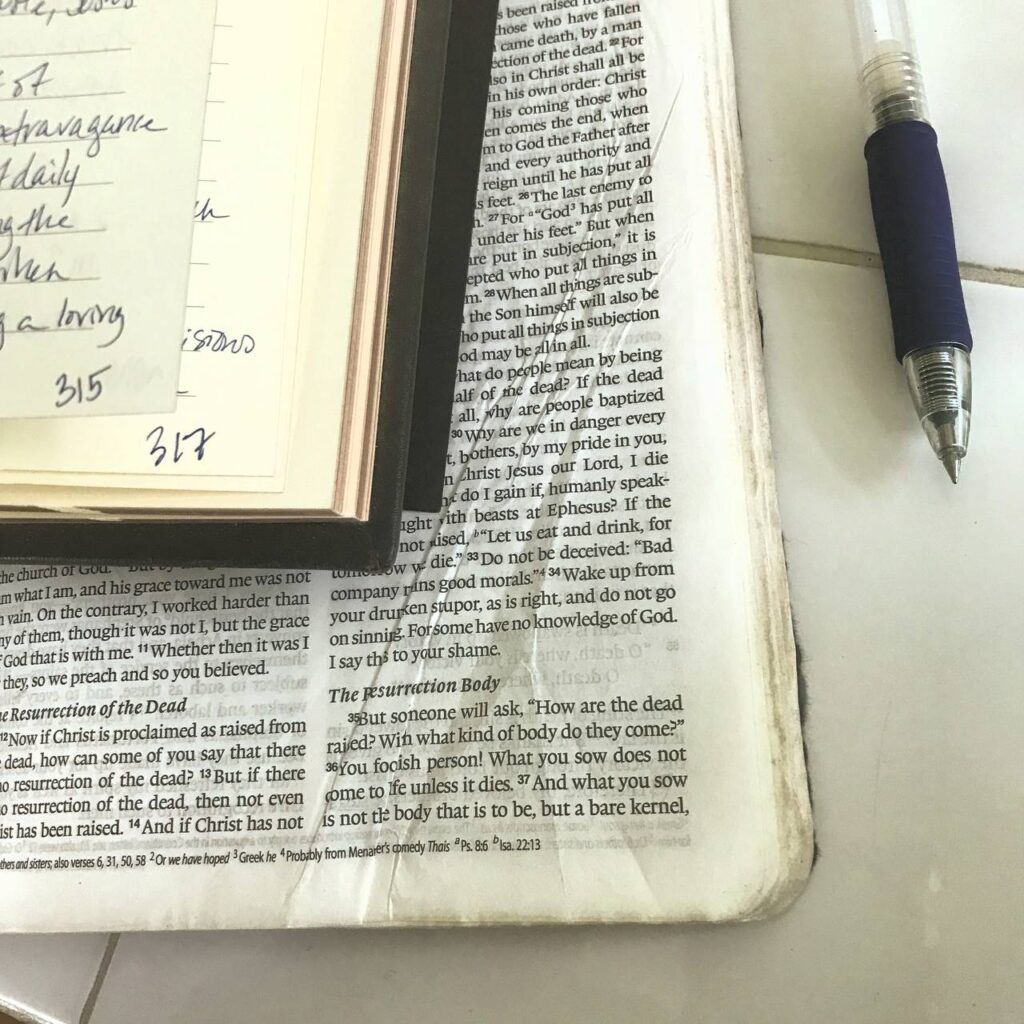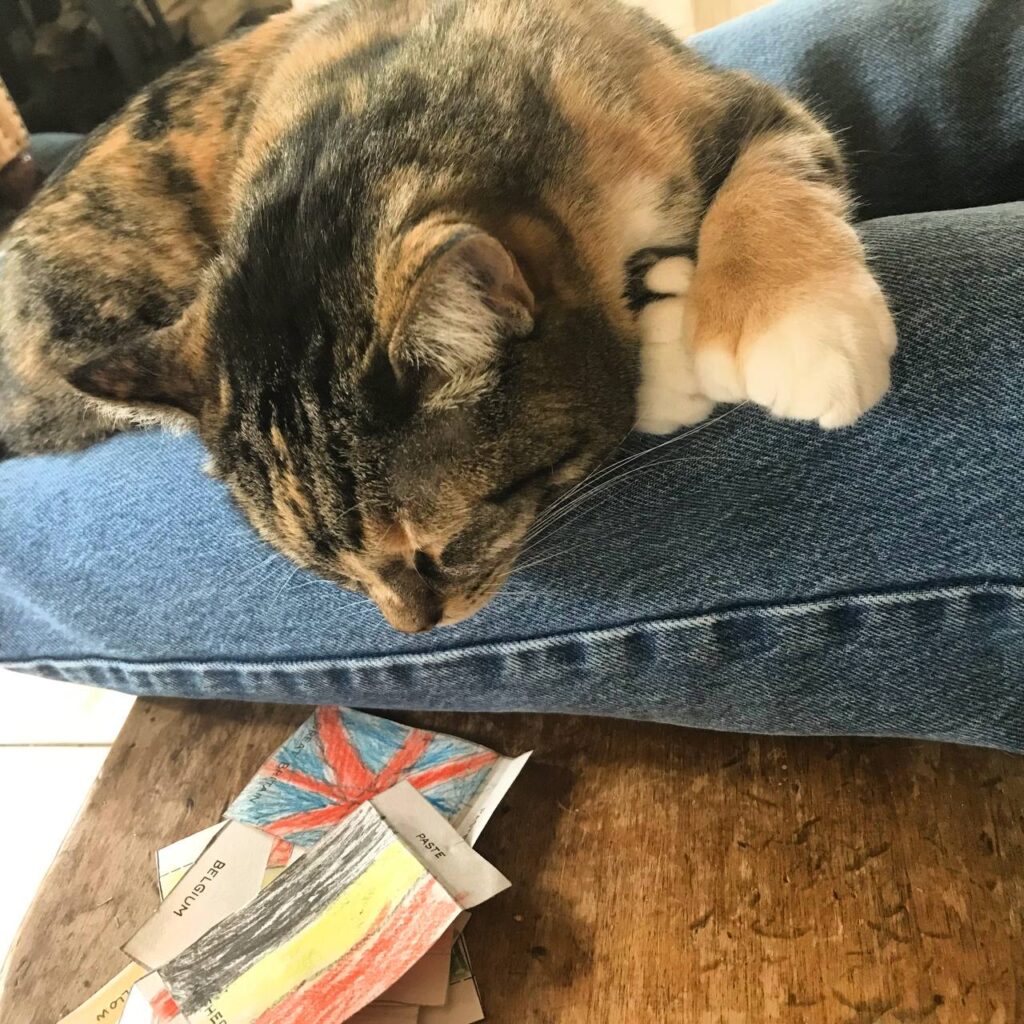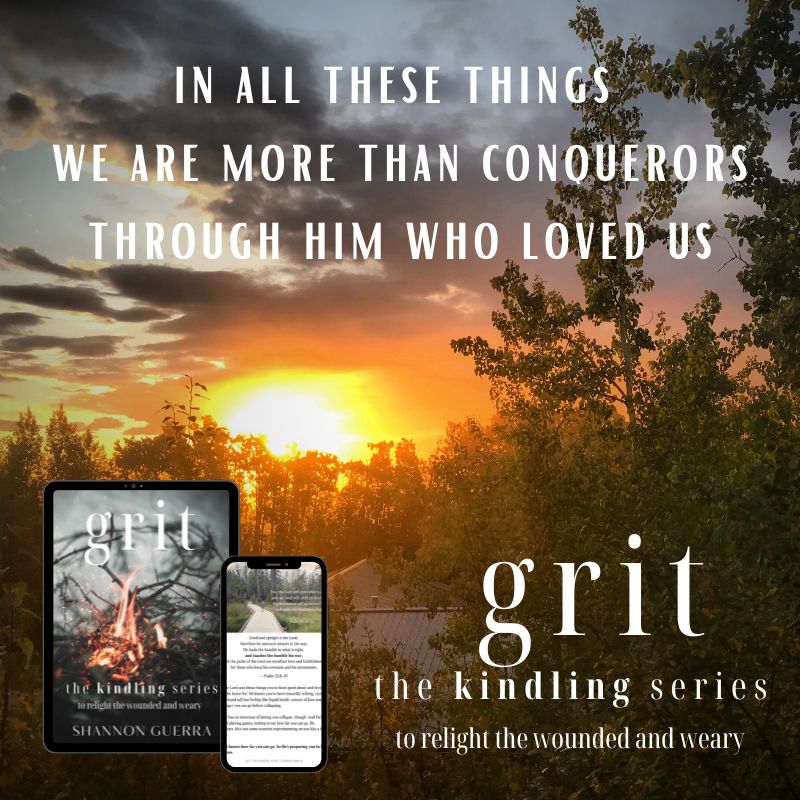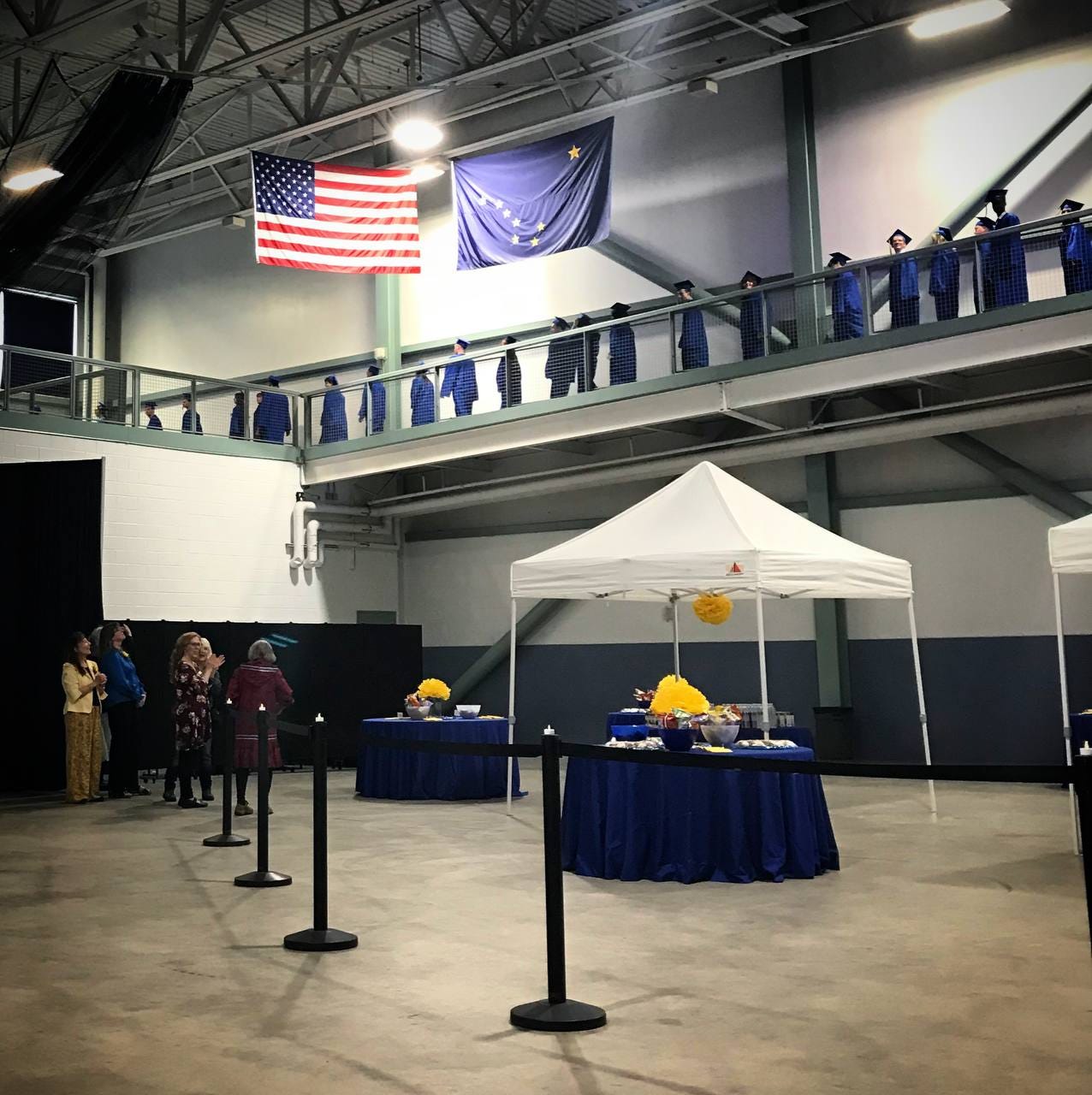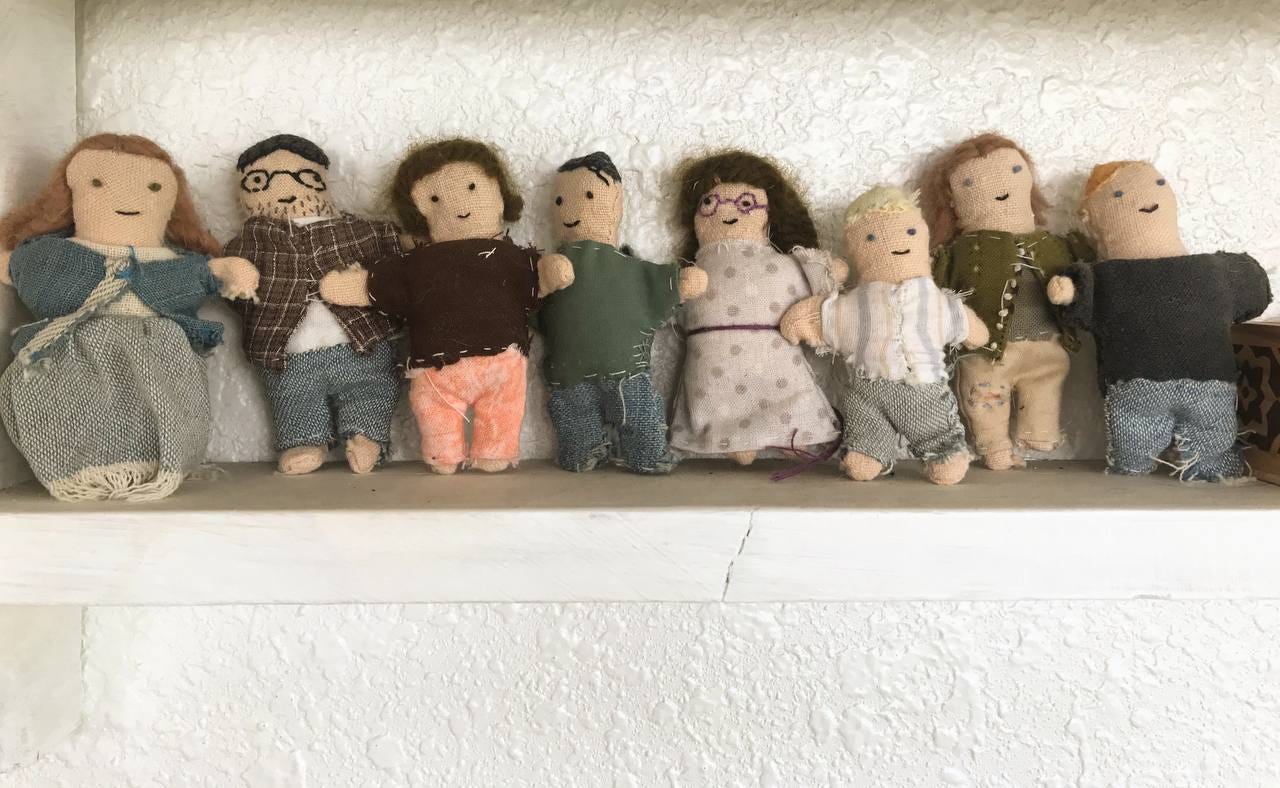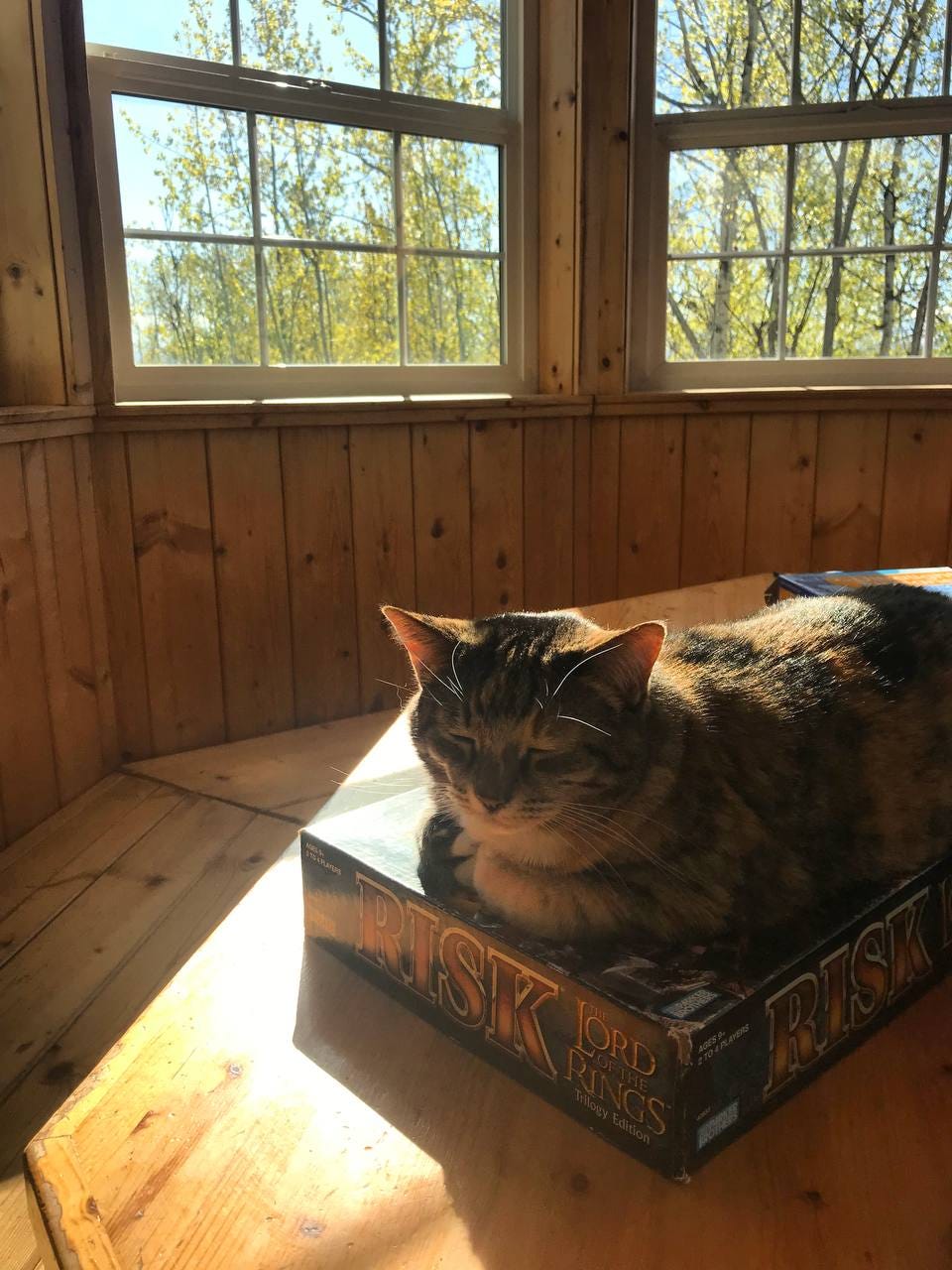I sat in the parking lot with Finn and Kav, waiting for the bus of campers to arrive. The boys were great but it was hot and muggy, and I was the whiny one. I’d skipped breakfast, wasn’t feeling well, and was starting to lean toward the exhausted and hangry side of things. A quick search in the car for snacks only produced a couple tins of mints.
Finally, I saw the girls, who had pulled into the other parking lot and gone through the opposite side of the building, and started to spill outside into our parking lot – and I tried to flag Cham down, but missed, and she went back in.
Ughhhh, fine. We got out to fetch her, and found her just inside. Hi, hugs, ready to go?
“I don’t think I can go yet.” She looked at her camp leader, who was on the phone listening to someone.
I raised an eyebrow, and the leader gave a tired smile.
“Okay,” she said into the phone, “so you want me to ask them…if they encountered God…and if they want to share a testimony?” Ah, talking to our youth pastor.”And see if they want to…record it…on a video?”
My extremely unspiritual response was, Ohh, no way. I had been sitting in the parking lot for twenty-five minutes, having hot flashes in a sweatshirt while trying to entertain two boys and wondering how many calories could be gleaned from an entire package of Altoids. I didn’t care if the campers saw angels, were slain in the spirit, or raised the dead; I needed to get home, eat some food, and probably go to bed.
Isn’t that terrible?

Every month, my premium subscribers and I have a q&p (which stands for question and ponder because I don’t need more pressure in life) and last month someone asked how we can keep from burning out, from losing our fire. We talked about people we respect who seem to have lost their first love, who used to be spiritually mature but now feel heavy to be around, who somehow waned, who seem more focused on problems than Jesus.
So, what causes that? How do we not end up there? And how can we help them return?
Hard questions, no easy answers, especially when we recognize our own struggles with just being tired and hangry. But let’s hash out a handful of them.
fear…or, worship of safety
We talked about how there’s a pooh-poohing tendency among some who’ve lost their fire, who walk in fear versus walking in love because safety is revered more than Jesus. And when safety is the idol, unfamiliarity can breed contempt.
Many fire starters seem dangerous and unfamiliar – new methods, new speakers, new worship styles…but also, old methods and routines (like prophecy or fasting or praying in tongues) can feel threatening to someone’s careful bubble of propriety if they’ve never experienced them before.
Sometimes people have weak beliefs that they don’t want challenged (or exposed) by those unfamiliar things. Further, they often don’t think other people could handle being exposed to them, either – which is fear-based control.
But we don’t walk in fear; we walk in love, and perfect love casts out fear.
So we have come to know and to believe the love that God has for us. God is love, and whoever abides in love abides in God, and God abides in him. By this is love perfected with us, so that we may have confidence for the day of judgment, because as he is so also are we in this world.
There is no fear in love, but perfect love casts out fear. For fear has to do with punishment, and whoever fears has not been perfected in love.
– 1 John 4:16-18
We still tend to face two trees – the tree of knowledge of good and evil, versus the tree of life – and sometimes still choose the forbidden tree of knowledge. Not that knowledge is bad, but the desire to be right at all costs is, because it places our trust in ourselves and our own goodness and right-ness.
If we want to be right more than righteous and free, if we are so busy accusing and policing others, if we are wanting all of our steps micromanaged in safe assurance rather than risking the wild interlocking of freedom and obedience, we aren’t looking at Jesus.
But He’s the One we need to know.
And I, when I came to you, brothers, did not come proclaiming to you the testimony of God with lofty speech or wisdom. For I decided to know nothing among you except Jesus Christ and him crucified. And I was with you in weakness and in fear and much trembling, and my speech and my message were not in plausible words of wisdom, but in demonstration of the Spirit and of power, so that your faith might not rest in the wisdom of men but in the power of God.
– 1 Corinthians 2:1-5
pain…or, fear 2.0
Acute pain, whether it’s physical or emotional, can overshadow everything else. I’ve struggled for years with a terrible skin condition and sometimes my skin hurts so bad as the water hits it in the shower that all I can do is focus on breathing as the humidity sears my nerves.
The other night I sat in the shower and had this moment of wondering why I was still there, doing nothing…I realized it was because I still needed to shave, but I was dreading the action of reaching out and grasping the razor with my hand. In the back of my mind, I knew that curling my hand around it, no matter how lightly, would be even more painful because my skin cracks with the movement, and movement comes with pain.
Some people’s fire has died out because they learned that movement can come with pain – and it’s not always true, but in their eyes, for the times it has been true it’s made it not worth the risk of trying again. The pain is louder than everything else.
We think of the phrase “first love” and things like innocence, naivety, joy, even immaturity or childlikeness come to mind. But life has hard spots that tend to harden us and teach us to fear. We realize there’s more to love than sunshine and rainbows, and sometimes the clouds take over.
In my life, I’ve developed a fairly jaded view of adoption, especially compared to people who have no experience with it. It’s not something I’m proud of; it’s something God is currently, actively working in me to heal. But that jadedness and hardness comes from being burned, from trying and loving and pursuing, and being rejected and wounded and traumatized in return.
Ministry can be really, really hard on people, and on marriages and families. It’s not meant to be (just as adoption isn’t meant to be traumatic) but it is the nature of the battle. It takes a lot of solid, core-nurturing structures and supports in place for people to take on any critical mission and not get burned while they’re fighting on the front lines. So for these spiritually mature people we hold in high esteem who seem to have lost that fire, I wonder if something like that has happened. I wonder how many are wounded warriors who have seen too much and not known what to do with it – or they didn’t have a community to help them deal with it.
resistance…or, unwillingness to surrender
Have you heard the Lord ask you to do that one thing, but you put it off, and eventually just never did it?
Yes? In a way, that’s a good sign. Not because you disobeyed, but that you remember, because it means you still hear Him.
However, if the answer is no because you’re inclined to shove something nebulous that you don’t want to be reminded of back into its hiding place – something you don’t want to deal with, something you want to forget, something you have no intention of ever letting the Lord convict you about – that’s a bad sign. Because eventually we can silence the Lord’s volume in our life by not responding to it. Coolness and stagnation come from resisting the Spirit; we get calloused to His nudges and promptings.
Sometimes we’re guilty of a willingness to do many good and hard things just to avoid the one thing He’s calling us to grow in. And we put spiritual spins on it: Worshipers will sing rather than intercede. Intercessors will intercede rather than process, confess, or forgive. Servants may attend all the functions and do, do, do while avoiding deep study of the Word, and allowing it to do the work in them.
The good news is it takes only one second to turn the volume back up again, as fast as thought: Lord, I’m sorry. I want to hear and obey. Make me willing.
distance…or, lack of abiding
We are responsible for our own abiding and proximity, but we’re also meant to hold each other up. Let’s go back to the fire analogy: We can be around people on fire, or we can be around people dripping wet, and their effect on the atmosphere is likely to affect our burning, too. And some church communities (or friend groups, or families) are just not burning.
Some of us have forgotten what it means to burn so much that the slightest movement that’s warmer than lukewarm seems to be fire, and it’s good enough.
We do ebb and flow. And that’s why we need each other, why we need to be discerning about our closest friends and community.If I get burned so badly there’s nothing left in me to light on fire and I just feel like wet ashes, I have friends who can listen and show me what it is to be on fire but not be consumed. And when they need help, I can do that for them, too.
But if I’m around those who are contentedly not burning, they’ll pat me on the back and tell me it’s okay to lose my fire. And if that attitude takes hold and I stop abiding entirely, who will be around to rekindle me?
So we need to circulate and remind others who they are and how they’re meant to burn, but maybe be careful about not overdoing it – be aware of our own abiding, and keep returning to those we trust who remind us of who we are, because our own fires can be put out by too many wet blankets. We need Holy Spirit to blow through and bring oxygen to keep us aflame, but we need the Living Water to keep us from burning out, too. Abiding in Him will keep us firmly in the sweet spot: On fire, but not consumed.
Here’s who we are:
So then you are no longer strangers and aliens, but you are fellow citizens with the saints and members of the household of God, built on the foundation of the apostles and prophets, Christ Jesus himself being the cornerstone, in whom the whole structure, being joined together, grows into a holy temple in the Lord. In him you also are being built together into a dwelling place for God by the Spirit.
– Ephesians 2:19-22
We are the house on fire He dwells in.
We don’t demand the furniture be arranged just so; we trust He knows the best layout. We open the Word as He opens us, and the clutter starts to burn away: the distractions all over the counters, the misunderstandings and misconceptions laying every which way on the shelves, the regrets spilled all over the floor. He puts things in their right places, making sure some don’t take up more space than they’re supposed to and that others take their rightful place on display instead of hidden away in a dusty corner.
He creates restful order, sweeping out lies, opening the windows and letting fresh air in so the smoke blows out – leaving pure joy, holiness, and desire. We didn’t know we could survive the fire until we surrendered to it.


